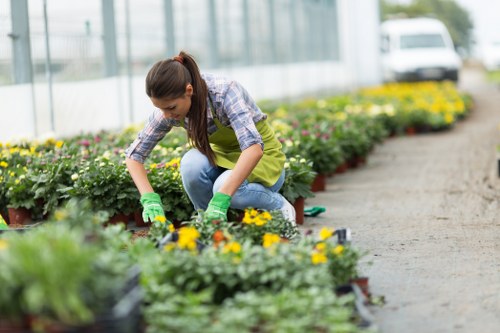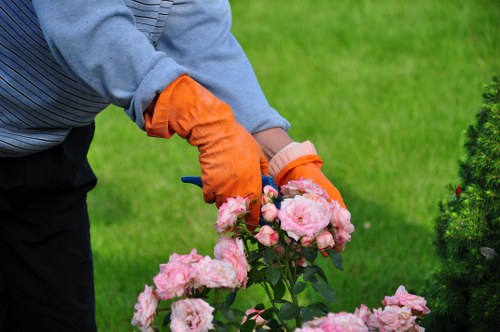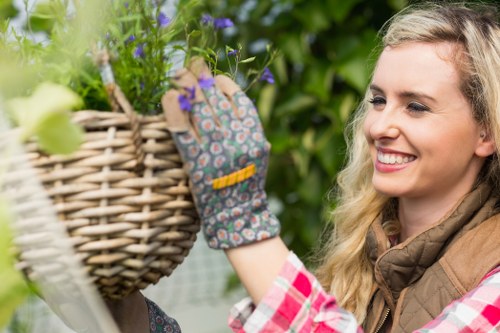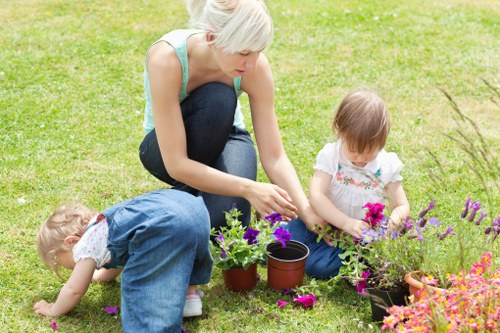Comprehensive Guide to Garden Maintenance in Beecroft
Introduction to Garden Maintenance

Maintaining a beautiful garden in Beecroft requires dedication, knowledge, and the right techniques. Whether you are a seasoned gardener or a beginner, understanding the essentials of garden maintenance can transform your outdoor space into a serene and vibrant oasis.
Beecroft’s unique climate and soil conditions present both opportunities and challenges for gardeners. With proper planning and regular care, you can ensure your garden thrives throughout the year.
In this guide, we will explore various aspects of garden maintenance, including seasonal tasks, plant selection, pest control, and landscaping tips tailored specifically for Beecroft residents.
Seasonal Garden Maintenance

Proper garden maintenance is highly dependent on the seasons. Each season brings its own set of tasks that are crucial for the health and beauty of your garden.
Spring Maintenance
As the weather warms up, spring is the perfect time to prepare your garden for the growing season. Start by clearing out any debris from the winter months and pruning overgrown plants.
Planting new flowers, vegetables, and shrubs during spring ensures a thriving garden. Additionally, applying a balanced fertilizer helps replenish the soil nutrients lost during winter.
Regular weeding and mulching are also essential during this time to prevent unwanted plants from taking over and to retain soil moisture.
Summer Garden Care

Summer in Beecroft can be quite hot, making it essential to adjust your garden maintenance routine accordingly. Adequate watering is key to keeping your plants healthy during the dry months.
Watering Strategies
Implementing efficient watering techniques, such as drip irrigation or soaker hoses, ensures that water reaches the root zones where it's needed most. Watering early in the morning or late in the evening minimizes evaporation and conserves water.
It's also important to monitor the soil moisture levels regularly. Overwatering can be just as harmful as underwatering, leading to root rot and other plant diseases.
Applying mulch helps retain soil moisture, suppresses weeds, and keeps the soil temperature stable during the scorching summer days.
Autumn Garden Preparations

Autumn is a crucial time for preparing your garden for the winter months. This season involves cleaning up fallen leaves, pruning perennials, and planting bulbs for spring blooms.
Planting and Pruning
Planting autumn bulbs such as tulips and daffodils ensures a colorful display in the spring. Additionally, pruning shrubs and trees helps maintain their shape and promotes healthy growth in the coming year.
Removing dead or diseased branches reduces the risk of pest infestations and plant diseases during winter.
Covering vulnerable plants with burlap or other protective materials can shield them from frost and harsh weather conditions.
Winter Garden Maintenance Tips

Winter may seem like a dormant period for gardens, but there are still important maintenance tasks to keep your garden healthy.
Protecting Plants
Insulating plants with mulch or straw helps protect the roots from freezing temperatures. Bringing potted plants indoors or into sheltered areas can prevent damage from frost and snow.
Regularly checking for pests and diseases ensures that any issues are addressed promptly, preventing further damage as the weather warms up in spring.
Planning and designing for the next growing season during winter allows you to make informed decisions about plant selection and garden layout.
Essential Tools for Garden Maintenance

Having the right tools is essential for effective garden maintenance. Investing in quality tools not only makes the work easier but also ensures longevity and better results.
- Pruning Shears: Essential for trimming and shaping plants.
- Garden Fork: Useful for turning and aerating the soil.
- Spade: Ideal for digging and planting.
- Garden Hose: Necessary for watering plants efficiently.
- Wheelbarrow: Helps in transporting soil, plants, and debris.
Regular maintenance and proper storage of these tools extend their lifespan and ensure they are ready for use whenever needed.
Choosing the Right Plants for Beecroft

Selecting plants that are well-suited to Beecroft’s climate is crucial for a thriving garden. Consider factors such as sunlight exposure, soil type, and water availability when choosing plants.
Native Plants
Native plants are adapted to the local environment, making them more resilient and easier to maintain. They also support local wildlife and contribute to the biodiversity of your garden.
Examples of native plants suitable for Beecroft include Eucalyptus trees, Kangaroo Paw, and Banksia species.
Perennials vs. Annuals
Perennials, such as lavender and ornamental grasses, provide long-lasting beauty and require less replanting compared to annuals. Annuals, like marigolds and petunias, offer vibrant colors but need to be replanted each year.
Incorporating a mix of both ensures continuous blooming and a dynamic garden throughout the seasons.
Pest and Disease Management

Effective pest and disease management is vital for maintaining a healthy garden. Regular monitoring and early intervention can prevent minor issues from escalating into major problems.
Identifying Common Pests
Common garden pests in Beecroft include aphids, snails, and caterpillars. Identifying these pests early allows for targeted treatments that minimize damage to your plants.
Natural predators, such as ladybugs and birds, can help control pest populations naturally. Introducing these beneficial insects into your garden reduces the need for chemical pesticides.
Managing Plant Diseases
Fungal diseases like powdery mildew and root rot can severely impact plant health. Ensuring proper air circulation, avoiding overwatering, and using disease-resistant plant varieties are effective strategies for disease management.
Removing and disposing of affected plant parts prevents the spread of diseases to healthy plants.
Soil Health and Fertilization
Healthy soil is the foundation of a thriving garden. Regular soil testing and appropriate fertilization ensure your plants receive the necessary nutrients.
Soil Testing
Conducting soil tests helps determine the pH level and nutrient content, allowing for tailored soil amendments. Beecroft’s soil can vary, so understanding its specific needs is crucial.
Organic matter, such as compost, improves soil structure, enhances water retention, and provides essential nutrients for plant growth.
Fertilization Techniques
Using balanced fertilizers that contain nitrogen, phosphorus, and potassium supports overall plant health. Applying fertilizers during the growing season promotes robust growth and vibrant blooms.
Slow-release fertilizers provide a steady supply of nutrients, reducing the risk of over-fertilization and minimizing environmental impact.
Mulching for Garden Health
Mulching is a vital practice in garden maintenance that offers multiple benefits, including moisture retention, weed suppression, and temperature regulation.
Benefits of Mulching
Applying a layer of mulch around your plants helps retain soil moisture, reducing the need for frequent watering. It also inhibits weed growth by blocking sunlight from reaching weed seeds.
Mulch acts as an insulator, keeping the soil cooler in summer and warmer in winter, which is particularly beneficial in Beecroft’s fluctuating climate.
Types of Mulch
There are various types of mulch to choose from, including organic options like bark, straw, and compost, as well as inorganic options like gravel and rubber.
Organic mulches enrich the soil as they decompose, while inorganic mulches provide long-lasting weed control without altering the soil composition.
Lawn Care and Maintenance
A well-maintained lawn adds aesthetic value and serves as a versatile space for outdoor activities. Proper lawn care involves regular mowing, watering, and fertilizing.
Mowing Techniques
Mowing your lawn at the right height encourages healthy grass growth. For most grass types in Beecroft, maintaining a height of 2.5 to 3 inches is ideal.
Avoid cutting more than one-third of the grass length at a time to prevent stress on the plants and promote thicker growth.
Watering Practices
Deep and infrequent watering encourages deep root growth, making the lawn more drought-resistant. It's best to water early in the morning to minimize evaporation and fungal growth.
Monitoring rainfall and adjusting your watering schedule accordingly helps conserve water and maintain a healthy lawn.
Hardscaping and Garden Structures
Incorporating hardscaping elements like pathways, patios, and garden structures enhances the functionality and visual appeal of your garden.
Pathways and Patios
Creating defined pathways using materials such as gravel, pavers, or natural stone guides visitors through your garden and prevents turf damage.
Patios provide a designated area for outdoor seating and entertainment, extending your living space into the garden.
Garden Structures
Adding structures like pergolas, arbors, and gazebos offers shade and shelter while serving as focal points in your garden design.
These structures can also support climbing plants, adding vertical interest and greenery to your garden.
Irrigation Systems for Efficient Watering
Installing an efficient irrigation system is essential for maintaining a healthy garden, especially during the hot summer months in Beecroft.
Types of Irrigation Systems
- Drip Irrigation: Delivers water directly to the plant roots, minimizing evaporation and water wastage.
- Sprinkler Systems: Suitable for lawns and larger garden areas, providing even water distribution.
- Soaker Hoses: Ideal for vegetable gardens and flower beds, allowing water to seep slowly into the soil.
Choosing the right irrigation system depends on your garden’s size, plant types, and water availability.
Maintenance of Irrigation Systems
Regularly inspecting your irrigation system for leaks, clogs, and proper alignment ensures efficient water delivery. Adjusting the system according to seasonal changes prevents overwatering or underwatering.
Automating your irrigation system with timers and moisture sensors can optimize water usage and reduce manual effort.
Composting and Sustainable Practices
Implementing sustainable garden practices like composting not only benefits your garden but also contributes to environmental conservation.
Benefits of Composting
Composting recycles organic waste, reducing landfill burden and producing nutrient-rich compost that enhances soil fertility.
Using compost improves soil structure, increases nutrient availability, and promotes healthy plant growth.
Other Sustainable Practices
Incorporating rainwater harvesting, using organic fertilizers, and practicing crop rotation are effective ways to maintain a sustainable garden.
These practices reduce reliance on chemical inputs, conserve water, and promote ecological balance in your garden.
Lighting and Garden Aesthetics
Proper lighting enhances the beauty and usability of your garden during the evening hours. It highlights key features and creates an inviting atmosphere.
Types of Garden Lighting
- Path Lights: Illuminate walkways and ensure safe navigation around your garden.
- Spotlights: Highlight specific plants, structures, or decorative elements.
- Ambient Lighting: Creates a soft, overall glow perfect for outdoor gatherings.
Integrating different types of lighting adds depth and dimension to your garden design.
Energy-Efficient Options
Using LED lights and solar-powered fixtures reduces energy consumption and minimizes environmental impact. These options are cost-effective in the long run and require less maintenance.
Choosing the right placement and focusing on key areas ensures effective lighting without unnecessary energy expenditure.
Local Climate Considerations in Beecroft
Understanding Beecroft’s local climate is essential for effective garden maintenance. The region experiences a temperate climate with distinct seasons, influencing plant growth and garden care routines.
Temperature and Rainfall
Beecroft enjoys mild to warm temperatures, with summer temperatures often reaching high levels that can stress plants. Adequate watering and providing shade to sensitive plants can mitigate heat stress.
Winter brings cooler temperatures and occasional frost, requiring protective measures for vulnerable plants and timely pruning.
Soil Characteristics
The soil in Beecroft varies, with areas exhibiting sandy or clayey textures. Conducting soil tests helps determine the necessary amendments to improve soil structure and fertility.
Amending soil with organic matter enhances its drainage and nutrient-holding capacity, creating a more favorable environment for plant roots.
10-15 Nearby Areas to Beecroft for Garden Services
Beecroft is surrounded by several neighborhoods that also benefit from professional garden maintenance services. Understanding the unique features of these nearby areas can help tailor your gardening approach.
- Epping: Just a few kilometers from Beecroft, Epping offers a mix of residential and commercial spaces requiring diverse garden care.
- North Epping: Known for its lush greenery, North Epping emphasizes sustainable gardening practices.
- Marsfield: Marsfield’s spacious gardens and parks benefit from regular maintenance and landscaping services.
- Eastwood: Eastwood’s vibrant community gardens thrive with proper care and attention.
- Chatswood: A bustling area where efficient garden maintenance keeps outdoor spaces tidy and appealing.
- Roseville: Roseville’s picturesque gardens require specialized services to maintain their beauty.
- Telopea: Telopea’s residential areas benefit from personalized garden maintenance plans.
- Pennant Hills: With expansive gardens, Pennant Hills needs comprehensive maintenance strategies.
- Rydalmere: Rydalmere’s gardens benefit from expert pest and disease management.
- Carlingford: Carlingford’s diverse plant life requires tailored maintenance techniques.
- Arcadia: Arcadia’s gardens benefit from both aesthetic and functional maintenance services.
- West Ryde: West Ryde’s urban gardens require efficient and space-optimizing maintenance solutions.
- Macquarie Park: Macquarie Park’s large estates benefit from professional landscaping and maintenance.
- Hunters Hill: Hunters Hill’s heritage gardens need specialized care to preserve their historical charm.
- Denistone: Denistone’s community gardens thrive with regular maintenance and local expertise.
Connecting with local garden maintenance services in these areas ensures consistent and high-quality care for your outdoor spaces.
Benefits of Professional Garden Maintenance Services
Hiring professional garden maintenance services in Beecroft offers numerous advantages, from expertise and time savings to enhanced garden aesthetics.
Expert Knowledge
Professional gardeners bring extensive knowledge of plant care, soil management, and pest control, ensuring your garden remains healthy and vibrant.
They stay updated with the latest gardening trends and techniques, applying best practices to your garden maintenance routine.
Time and Effort Savings
Maintaining a garden can be time-consuming and physically demanding. Professional services take on these tasks, allowing you to enjoy your garden without the hassle.
They efficiently manage all aspects of garden care, from regular mowing and pruning to seasonal planting and landscaping projects.
Enhancing Garden Aesthetics
Aesthetically pleasing gardens not only boost the curb appeal of your property but also provide a tranquil environment for relaxation and entertainment.
Design and Layout
Thoughtful garden design and layout create a harmonious balance between plants, structures, and open spaces. Incorporating elements like color schemes, plant textures, and focal points adds visual interest.
Using principles of landscaping design, such as symmetry, balance, and proportion, ensures a cohesive and attractive garden.
Plant Selection and Arrangement
Carefully selecting and arranging plants based on their growth habits, colors, and seasonal variations enhances the overall garden aesthetics. Grouping plants with similar light and water requirements simplifies maintenance.
Layering plants of different heights and textures adds depth and dimension, creating a visually appealing landscape.
Sustainable Gardening Practices
Adopting sustainable gardening practices benefits both your garden and the environment. These practices promote ecological balance, conserve resources, and reduce the garden’s carbon footprint.
Water Conservation
Implementing water-saving techniques, such as rainwater harvesting and using drought-resistant plants, reduces water consumption and ensures efficient use of this vital resource.
Mulching and proper irrigation methods also contribute to water conservation by minimizing evaporation and runoff.
Organic Gardening
Using organic fertilizers and pest control methods avoids the use of harmful chemicals, promoting a healthier ecosystem for plants, animals, and humans.
Composting and recycling garden waste enrich the soil naturally, fostering sustainable plant growth.
Conclusion and Call to Action
Effective garden maintenance in Beecroft involves understanding the local climate, selecting appropriate plants, and implementing sustainable practices. Regular care and professional services can transform your garden into a beautiful and thriving space.
Whether you are looking to enhance your garden’s aesthetics, improve soil health, or manage pests naturally, the right strategies and expertise can make all the difference.
Don’t wait to create your dream garden. Contact us today to book your garden maintenance service and take the first step towards a greener, more vibrant outdoor space.
